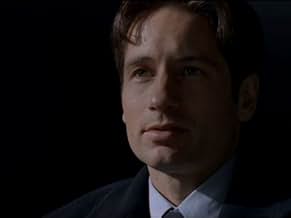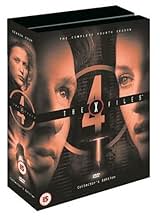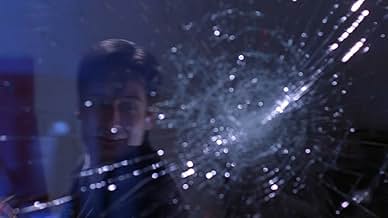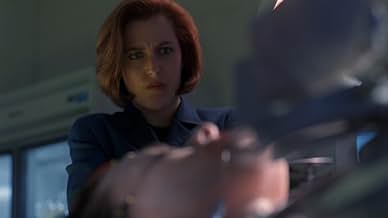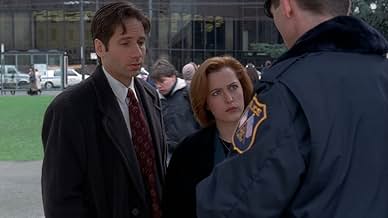A mysterious old man is killing scientists working on the development of a cryobiologic compound. He freezes them to death with this same compound that doesn't even exist yet.A mysterious old man is killing scientists working on the development of a cryobiologic compound. He freezes them to death with this same compound that doesn't even exist yet.A mysterious old man is killing scientists working on the development of a cryobiologic compound. He freezes them to death with this same compound that doesn't even exist yet.
- Detective
- (as Aureleo Di Nunzio)
- The Bellman
- (uncredited)
- The Bus Driver
- (uncredited)
As Mulder (David Duchovny) and Scully (Gillian Anderson) become involved in the investigation, they uncover a convoluted plot involving Jason's older self, who has traveled back in time to prevent a future catastrophe. The pacing of "Synchrony" is brisk, effectively maintaining tension as the agents navigate through layers of intrigue and moral complexity. A particularly striking moment occurs when Mulder confronts the implications of time travel, questioning whether altering past events can truly lead to a better future. This philosophical inquiry adds depth to the narrative, inviting viewers to reflect on the nature of fate and free will.
Visually, "Synchrony" employs a dark and atmospheric aesthetic that enhances its themes of uncertainty and foreboding. Charleston's direction captures both the sterile environment of the scientific community and the emotional turmoil experienced by the characters as they grapple with their choices. The cinematography utilizes shadows and stark lighting to evoke feelings of dread, particularly during scenes where characters confront their own mortality. Critics have noted that this visual storytelling immerses viewers in a world where time itself becomes an antagonist.
The performances in this episode are commendable, especially from Rodgers as Jason Nichols. His portrayal captures the desperation of a man caught between two timelines; he embodies both vulnerability and determination as he seeks to change his fate. Duchovny delivers a strong performance as Mulder, showcasing his relentless pursuit of truth while grappling with the ethical implications of time travel. Anderson's Scully provides a rational counterbalance; her skepticism grounds Mulder's theories while emphasizing her concern for the potential consequences of their actions. The chemistry between Duchovny and Anderson continues to shine throughout the episode, adding depth to their partnership as they confront complex moral dilemmas.
Thematically, "Synchrony" raises significant questions about morality, responsibility, and the nature of progress. The episode critiques how scientific advancements can lead to unforeseen consequences; it examines how individuals can become entangled in webs of ambition and regret. Additionally, it highlights societal attitudes toward authority; characters like Jason represent those who challenge established norms in pursuit of knowledge. This exploration invites viewers to reflect on their beliefs regarding accountability, ethics, and the impact of their choices on future generations.
- fernandoschiavi
- Jan 21, 2025
- Permalink
Storyline
Did you know
- TriviaIt's the second time that Mulder quotes Scully's thesis.
- Goofs(At around 40 mins) Lisa Ianelli is headed Downtown on the 4221 bus but gets off a bus numbered 4170.
- Quotes
Fox Mulder: Think about it, Scully. If Lucas Menand never gets hit by that bus, his complaint gets heard before the grand committee, Jason Nichols loses his funding and he never gets to collaborate on his research with Dr. Yonechi. Therefore, this photograph never gets taken because this celebration never happens.
Dana Scully: And if your sister is your aunt and your mother marries your uncle, you'd be your own grandpa.
- ConnectionsReferences The Iceman Cometh (1960)










